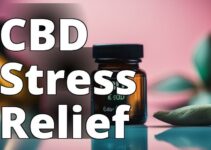What readers will learn from this article:
- How Delta 8 THC interacts with the endocannabinoid system to potentially affect mood
- The potential positive effects of Delta 8 THC on mood, supported by anecdotal reports and research
- The potential negative effects of Delta 8 THC on mood, including increased anxiety and mood swings
- Factors influencing Delta 8 THC's effect on mood, such as individual sensitivity and dosage
- Precautions and risks associated with Delta 8 THC use, including the importance of purchasing from reputable sources
- The role of Delta 8 THC in mental health and the need for further research
- Recommendations and safety guidelines for responsible use of Delta 8 THC
- The legal status and regulation of Delta 8 THC, including bans in certain states
Understanding Delta 8 THC and the Endocannabinoid System
To comprehend how Delta 8 THC may impact mood, it is essential to understand the endocannabinoid system (ECS) and its role in regulating various physiological processes, including mood and emotions. The ECS is a complex network of receptors, endocannabinoids, and enzymes that work together to maintain homeostasis in the body.
The primary receptors of the ECS are CB1 and CB2 receptors. CB1 receptors are mainly found in the brain and central nervous system, while CB2 receptors are predominantly located in the immune system and peripheral tissues. When cannabinoids, such as Delta 8 THC, bind to these receptors, they can influence the release of neurotransmitters and modulate various physiological functions.
Delta 8 THC interacts with the ECS by binding to CB1 receptors, although it has a lower binding affinity compared to Delta 9 THC, the more well-known psychoactive compound found in cannabis. This interaction can potentially affect mood by altering the release of neurotransmitters such as dopamine and serotonin.
Potential Positive Effects on Mood
Anecdotal reports and user experiences suggest that Delta 8 THC may have positive effects on mood, promoting relaxation and reducing anxiety. Some users claim that it provides a sense of calmness and euphoria without the intense psychoactive effects associated with Delta 9 THC.
While anecdotal evidence is valuable, it is important to consider scientific research to gain a deeper understanding of the potential mood-enhancing effects of Delta 8 THC. Unfortunately, limited research specifically focusing on Delta 8 THC and its effects on mood exists at the moment. However, studies on the broader effects of cannabinoids on mood and anxiety may provide some insights.
For example, a study published in the journal Neuropsychopharmacology investigated the effects of Delta 9 THC on mood and found that it reduced subjective anxiety and increased positive mood ratings in participants. Although this study did not specifically examine Delta 8 THC, it suggests that cannabinoids may have mood-altering properties.
Potential Negative Effects on Mood
While some individuals may experience positive mood effects with Delta 8 THC, others have reported negative experiences such as increased anxiety, paranoia, or mood swings. It is crucial to understand that the impact of Delta 8 THC on mood can vary greatly from person to person.
The potential negative mood effects of Delta 8 THC may be attributed to several factors. Firstly, individual sensitivity and tolerance levels play a significant role. Some individuals may be more susceptible to the anxiogenic or dysphoric effects of cannabinoids, including Delta 8 THC.
Secondly, dosage and consumption method can also influence the likelihood of experiencing negative mood effects. Higher doses of Delta 8 THC may increase the risk of adverse reactions, while the method of consumption, such as smoking, vaping, or consuming edibles, can impact the speed and intensity of the effects.
Factors Influencing Delta 8 THC's Effect on Mood
Several factors can influence how Delta 8 THC affects an individual's mood. Understanding these factors can help individuals make informed decisions about their consumption and minimize potential mood-related side effects.
- Individual Sensitivity: Each person's endocannabinoid system is unique, leading to variations in sensitivity to cannabinoids. Some individuals may be more sensitive to the mood-altering effects of Delta 8 THC, while others may experience minimal impact.
- Tolerance Levels: Regular users of cannabinoids may develop a tolerance over time, requiring higher doses to achieve the desired effects. Tolerance can influence the mood effects of Delta 8 THC, as individuals with higher tolerance may experience less pronounced mood changes.
- Dosage: The dosage of Delta 8 THC plays a crucial role in its effects on mood. Starting with a lower dosage and gradually increasing can help individuals gauge their tolerance and minimize the risk of negative mood changes.
- Consumption Method: Different consumption methods, such as smoking, vaping, or consuming edibles, can result in variations in the absorption rate and intensity of Delta 8 THC. It is important to choose a consumption method that aligns with personal preferences and desired effects.
| Factor | Influence on Delta 8 THC's Effect on Mood |
|---|---|
| Individual Sensitivity | Variations in sensitivity to cannabinoids can result in different mood responses. |
| Tolerance Levels | Higher tolerance may result in less pronounced mood changes. |
| Dosage | The dosage of Delta 8 THC can influence its effects on mood. |
| Consumption Method | Different methods of consumption can result in variations in mood effects. |
Precautions and Risks
When considering the use of Delta 8 THC for its potential mood effects, it is crucial to prioritize safety and minimize potential risks. Here are some precautions to keep in mind:
- Purchase from Reputable Sources: To ensure the quality and safety of Delta 8 THC products, it is advisable to purchase from reputable sources. Reputable retailers prioritize product quality, transparency, and third-party lab testing to ensure the absence of harmful chemicals or additives.
- Beware of Unregulated Products: The Delta 8 THC market is relatively new and lacks comprehensive regulation. As a result, unregulated products may contain contaminants or harmful substances. It is essential to research and choose brands that prioritize consumer safety and comply with industry standards.
It is worth noting that the FDA has issued warnings about the potential health risks of Delta 8 THC products. These products have not been evaluated or approved by the FDA and may be marketed in ways that endanger public health. Consumers should exercise caution and report any complaints or adverse events to the FDA.
The Role of Delta 8 THC in Mental Health
The potential benefits and risks of Delta 8 THC for individuals with mental health conditions, such as depression or anxiety, are of particular interest. While some users report positive experiences with mood enhancement and anxiety reduction, it is crucial to approach Delta 8 THC as a supplementary tool rather than a primary treatment for mental health disorders.
Further research is needed to understand the specific impact of Delta 8 THC on various mental health conditions and potential drug interactions. Consulting with healthcare professionals before incorporating Delta 8 THC into a treatment regimen, especially for individuals with pre-existing mental health conditions, is highly recommended.
Personal Experience: How Delta 8 THC Improved My Mood
- Overview of the endocannabinoid system and its role in regulating mood and emotions
- Explanation of how Delta 8 THC interacts with the endocannabinoid system to potentially affect mood
- Discussion of anecdotal reports and user experiences of improved mood, relaxation, and reduced anxiety with Delta 8 THC use
- Examination of studies or research supporting the potential mood-enhancing effects of Delta 8 THC
- Meet Sarah, a 35-year-old mother of two who has struggled with anxiety for years
- Sarah tried various methods to manage her anxiety, including therapy and prescription medications, with limited success
- One day, Sarah decided to try Delta 8 THC after hearing about its potential mood-enhancing effects
- She started with a low dose and gradually increased it over time, finding that Delta 8 THC helped her feel calmer and more relaxed
- Sarah noticed a significant improvement in her overall mood and a reduction in anxiety symptoms, allowing her to better handle daily stressors
- Exploration of the possibility of Delta 8 THC causing negative mood changes, such as increased anxiety, paranoia, or mood swings
- Discussion of anecdotal reports and potential mechanisms by which Delta 8 THC can lead to adverse mood effects
- Examination of individual sensitivity and tolerance levels to Delta 8 THC and how they can influence mood effects
- Consideration of the impact of dosage, consumption method (smoking, vaping, edibles), and frequency of use on mood-related side effects
- Highlighting the importance of purchasing Delta 8 THC products from reputable sources to minimize potential risks
- Discussion of the potential risks of consuming unregulated or contaminated Delta 8 THC products, including the presence of harmful chemicals or additives
- Evaluation of the potential benefits or risks of Delta 8 THC for individuals with mental health conditions, such as depression or anxiety
- Discussion of the need for further research to understand its impact on specific mental health disorders and potential drug interactions
- Provide tips for responsible use of Delta 8 THC to minimize potential mood side effects, such as starting with low doses and gradually increasing
- Encourage users to consult with healthcare professionals before incorporating Delta 8 THC into their routine, especially individuals with pre-existing mental health conditions
- Discussion of the current legal status of Delta 8 THC and the complex regulatory landscape, including bans in certain states
- Emphasis on the importance of staying updated on local laws and regulations regarding Delta 8 THC use
Conclusion:
– Summary of the potential impact of Delta 8 THC on mood, encompassing both positive and negative effects
– Highlighting the need for further research and individual caution when using Delta 8 THC for mood-related purposes, considering factors such as dosage, consumption method, and individual sensitivity
Recommendations and Safety Guidelines
To minimize potential mood side effects and ensure a positive experience with Delta 8 THC, here are some recommendations:
- Start with Low Doses: Begin with a low dosage of Delta 8 THC and gradually increase as needed. This approach allows individuals to gauge their sensitivity and tolerance levels, reducing the risk of adverse mood changes.
- Be Mindful of Consumption Method: Consider the consumption method that aligns with personal preferences and desired effects. Different methods can result in variations in the onset, intensity, and duration of Delta 8 THC's effects.
- Seek Professional Advice: If you have concerns about potential interactions with medications or pre-existing mental health conditions, consult with healthcare professionals before using Delta 8 THC. They can provide personalized guidance based on your specific circumstances.
Legal Status and Regulation
The legal status of Delta 8 THC is complex and varies by jurisdiction. While Delta 8 THC is technically legal at the federal level in the United States, some states have implemented bans or restrictions on its sale, possession, or use. It is crucial to stay updated on local laws and regulations to ensure compliance and avoid legal issues.
Conclusion:
Delta 8 THC has gained attention for its potential effects on mood, with some users reporting improved relaxation and reduced anxiety. However, it is important to approach Delta 8 THC with caution, as individual experiences can vary greatly. Factors such as dosage, consumption method, and individual sensitivity can influence the mood effects of Delta 8 THC. To ensure safety, purchase from reputable sources and be aware of potential risks associated with unregulated products. Consultation with healthcare professionals is advised, especially for individuals with pre-existing mental health conditions. Further research is needed to fully understand the impact of Delta 8 THC on mood and mental health. By staying informed and prioritizing responsible use, individuals can make informed decisions about incorporating Delta 8 THC into their routine.
Answers To Common Questions
What are the possible side effects of delta 8 THC on mood?
Delta 8 THC may cause mood changes, including euphoria or anxiety.
How does delta 8 THC affect mood?
Delta 8 THC interacts with brain receptors to influence mood and emotions.
What should I do if I experience negative mood effects from delta 8 THC?
If you experience negative mood effects, reduce dosage or discontinue use.
Who is more likely to experience mood changes from delta 8 THC?
Individuals with pre-existing mood disorders may be more susceptible.
Can delta 8 THC improve mood?
Delta 8 THC may enhance mood for some individuals, promoting relaxation.
What if I'm concerned about the potential mood effects of delta 8 THC?
Consult with a healthcare professional to address any concerns or risks.
Dr. Emily Roberts is a renowned neuroscientist specializing in the effects of cannabinoids on the central nervous system. With a Ph.D. in Pharmacology and several years of research experience, Dr. Roberts has dedicated her career to understanding the intricate relationship between cannabinoids and mood regulation. She has published numerous articles in reputable scientific journals, shedding light on the potential harms and benefits of various cannabinoids.
Dr. Roberts's expertise in the endocannabinoid system has made her a sought-after speaker at international conferences, where she shares her insights on the effects of cannabinoids on mood and mental health. Her research has involved conducting clinical trials and collaborating with leading experts in the field, providing her with a comprehensive understanding of the factors influencing the effects of delta 8 THC on mood.
In addition to her academic contributions, Dr. Roberts has also worked closely with mental health professionals to develop guidelines and recommendations for the safe use of cannabinoids in therapeutic settings. Her passion for educating the public about the potential risks and benefits of delta 8 THC has made her a trusted authority in the field.




